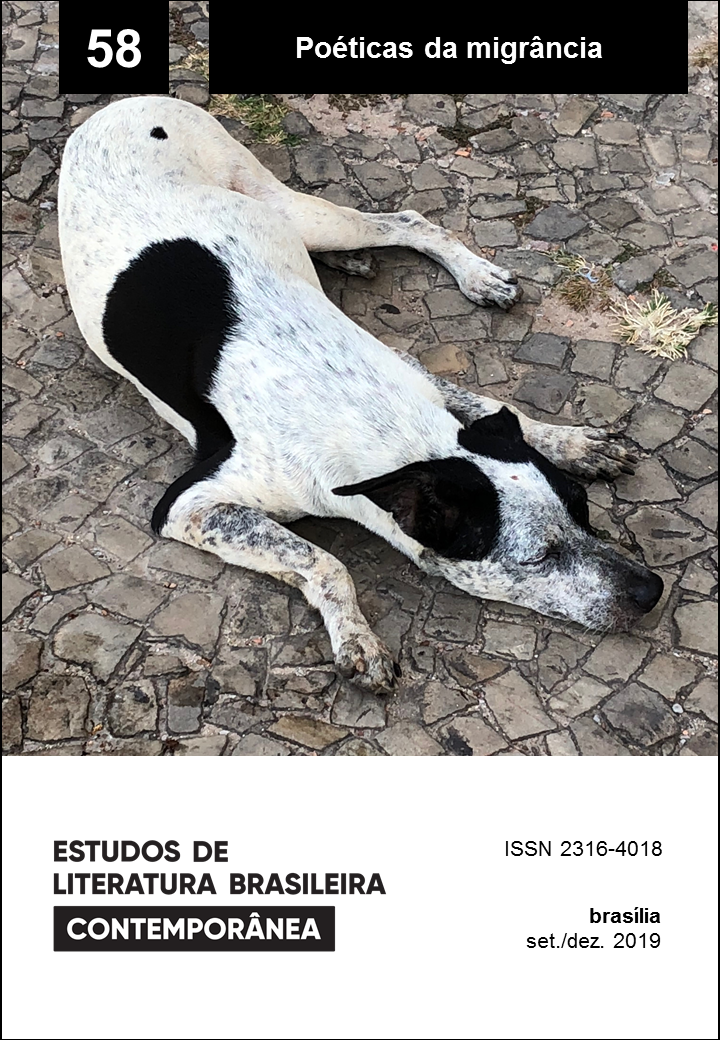“Requiem for a loner”: migrations, self exile, melancholy
DOI:
https://doi.org/10.1590/2316-4018582Keywords:
Jewish migration, melancholy, Samuel Rawet, Requiem for a lonerAbstract
Since the 20th century, spatial displacement and migrations have occupied an important place among Brazilian letters. The characters of such narratives deal with difficult situations, challenging them to self-discovery in order to bear with experiences of estrangement, coldness and indifference from the Other and the separation from national land and culture. Beyond the geographical transits, these characters deal with subjective displacement in which they are exiled even from themselves. This article analyzes these aspects in the short story “Requiem for a loner” by Samuel Rawet, in which the main character, a European Jew living in Brazil, experiences not only the isolation of the immigrant, but more poignantly, the loneliness of the melancholic experience.
Downloads
References
BARBOSA, Amilcar Bettega (2006). Matemática do conto. Entrevista concedida a Carlos Eduardo Ortolan Miranda. Revista Trópico. Disponível em: https://bit.ly/2kskcyM. Acesso em: 31 jan. 2019.
BENJAMIN, Walter (1984). Origem do drama barroco alemão. Tradução, apresentação e notas de Sérgio Paulo Rouanet. São Paulo: Brasiliense.
BERND, Zilá (2010). Introdução. In: BERND, Zilá et al. Dicionário das mobilidades culturais: percursos americanos. Porto Alegre: Literalis. p. 11-25.
BRASIL, Assis (1975). Samuel Rawet. In: BRASIL, Assis. A nova literatura III: o conto. Rio de Janeiro: Americana; Brasília: INL. p. 67-72.
CALLIGARIS, Contardo (1992). Apresentação. In: MELMAN, Charles. Imigrantes: incidências subjetivas das mudanças de língua e país. Tradução de Rosane Pereira. São Paulo: Escuta. p. 9-13.
COSTA, Rogério Haesbaert da (2007). O mito da desterritorialização: do “fim dos territórios” Ã multerritorialidade. 3. ed. Rio de Janeiro: Bertrand Brasil.
CUNHA, Fausto (2008). Orelha da 1. ed. de Contos do imigrante. In: SANTOS, Francisco Venceslau dos (Org.). Samuel Rawet: fortuna crítica em jornais e revistas. Rio de Janeiro: Caetés. p. 51-54.
ENRIQUEZ, Eugène (1998). O judeu como figura paradigmática do estrangeiro. Tradução de Eliana Borges Pereira Leite. In: KOLTAI, Caterina (Org.). O estrangeiro. São Paulo: Escuta: FAPESP. p. 37-60.
FICIN, Marsile (1987). La mélancolie des intellectuels. Le Magazine Littéraire: Litterature et Mélancolie, Paris, n. 244, p. 32-34, jul./ago.
FLAUBERT, Gustave (2003). Madame Bovary. São Paulo: Nova Cultural.
FREUD, Sigmund (1987). Luto e melancolia [1917]. In: FREUD, Sigmund. Edição standard brasileira das obras psicológicas completas. Tradução de Jayme Salomão. 2. ed. Rio de Janeiro: Imago. v. 14, p. 243-263.
NUNES, Benedito (1983). Reflexões sobre o moderno romance brasileiro. In: PROENÇA FILHO, Domício (Org.). O livro do seminário 1ª Bienal Nestlé de Literatura Brasileira. São Paulo: LR. p. 43-69.
NUNES, Benedito (1988). O tempo na narrativa. São Paulo: Ática. (Fundamentos, n. 31).
PINHEIRO, Teresa (2012). O modelo melancólico e os sofrimentos da contemporaneidade. In: VERZTMAN, Julio et al. (Org.). Sofrimentos narcísicos. Rio de Janeiro: Cia. de Freud: UFRJ; Brasília: Capes/Prodoc. P. 17-38.
RAWET, Samuel (1998). A prece. In: RAWET, Samuel. Contos do imigrante. 2. ed. Rio de Janeiro: Ediouro. p. 31-37.
RAWET, Samuel (1998). Contos do imigrante. 2. ed. Rio de Janeiro: Ediouro.
RAWET, Samuel (1998). O profeta. In: RAWET, Samuel. Contos do imigrante. 2. ed. Rio de Janeiro: Ediouro. p. 23-30.
RAWET, Samuel (1998). Réquiem para um solitário. In: RAWET, Samuel. Contos do imigrante. 2. ed. Rio de Janeiro: Ediouro. p. 53-62.
ROUART, Marie-France (1997). O mito do judeu errante. In: BRUNEL, Pierre (Org.). Dicionário de mitos literários. Tradução de Carlos Sussekind et al. Rio de Janeiro: José Olympio. p. 665-672.
ROUDINESCO, Elisabeth; PLON, Michel (1998). Dicionário de psicanálise. Tradução de Vera Ribeiro e Lucy Magalhães. Rio de Janeiro: Zahar.
SCLIAR, Moacyr (2003). Saturno nos trópicos: a melancolia europeia chega ao Brasil. São Paulo: Companhia das Letras.
SILVA, Rafael (2014). Relações topofílicas. Laboratório filosófico. Blog de Rafael Silva, Rio de Janeiro, 14 dez. Disponível em: https://bit.ly/2kpLJRp. Acesso em: 8 fev. 2019.
SONTAG, Susan (1986). Sob o signo de Saturno. In: SONTAG, Susan. Sob o signo de Saturno. Tradução de Ana Maria Capovilla e Albino Poli Jr. Porto Alegre: L&PM. P. 85-103.
VIDAL, Paloma (2004). A história em seus restos: literatura e exílio no Cone Sul. São Paulo: Annablume.
WALDMAN, Berta (2002). Noturno suburbano. In: WALDMAN, Berta. Entre passos e rastros: presença judaica na literatura brasileira contemporânea. São Paulo: Perspectiva; Fapesp; Associação Universitária de Cultura Judaica. p. 67-100. (Estudos, n. 191).
Downloads
Published
How to Cite
Issue
Section
License
Authors who publish in this journal agree to the following terms:
a) The authors maintain the copyright and grant the journal the right of first publication, the work being simultaneously licensed under the Creative Commons Attribution License-Non Commercial 4.0 which allows the sharing of the work with acknowledgment of the authorship of the work and publication this journal.
b) Authors are authorized to enter into additional contracts separately, for non-exclusive distribution of the version of the work published in this journal (eg publish in institutional repository or as a book chapter), with authorship recognition and publication in this journal.
c) Authors are allowed and encouraged to publish and distribute their work online (eg in institutional repositories or on their personal page) after the editorial process, as this can generate productive changes, as well as increase the impact and citation of published work (See The Effect of Free Access).
d) The authors of the approved works authorize the magazine to, after publication, transfer its content for reproduction in content crawlers, virtual libraries and the like.
e) The authors assume that the texts submitted to the publication are of their original creation, being fully responsible for their content in the event of possible opposition by third parties.


